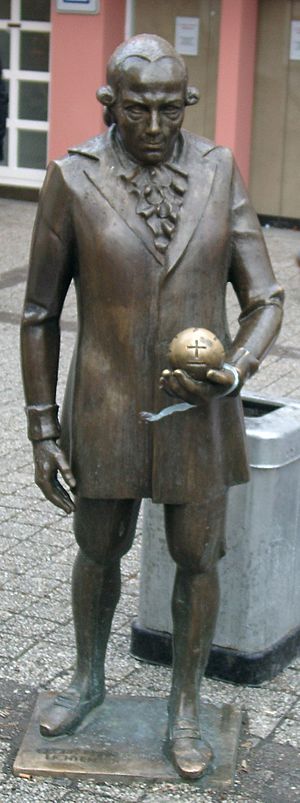Paradigm facts for kids
A paradigm is a way of thinking about a problem or a subject. Think of it as a big idea or a model that helps us understand the world. For example, for a long time, people believed the Earth was the center of the universe. This was a major paradigm. Later, the idea that the Earth and other planets move around the sun became the new paradigm. The word "paradigm" comes from an old Greek word meaning "pattern" or "example." One of the first modern thinkers to use this word was Georg Christoph Lichtenberg (1742-1799), a German mathematician and scientist.
Contents
What is a Paradigm?
A paradigm is more than just a single idea. It's a whole set of beliefs, values, and ways of doing things that are accepted by a community. It shapes how people see the world and how they solve problems. When a new discovery or idea challenges an old paradigm, it can lead to a big shift in how we understand things. This is sometimes called a "paradigm shift."
Paradigms in History and Science
Throughout history, different paradigms have guided scientific thought.
- The idea that the Earth was flat was an early paradigm.
- The shift to believing the Earth is round was a major paradigm change.
- In medicine, the idea that diseases were caused by "bad air" was an old paradigm.
- The discovery of germs and bacteria led to a new paradigm in understanding illness.
These shifts show how our understanding of the world can change over time as new information comes to light.
Using Examples (Paradeigma)
In ancient rhetoric, which is the art of speaking or writing effectively, the Greek word paradeigma was used in a special way. It meant using an example or illustration to help guide an audience. This example wasn't meant to tell people exactly what to think. Instead, it helped them understand a point and come to their own conclusions.
Think of it like a personal accountant. An accountant doesn't tell you exactly what to spend your money on. Instead, they guide you on how to manage your money based on your goals. This guidance helps you make good choices. The ancient Greek thinker Anaximenes described paradeigma as "actions that have occurred previously and are similar to, or the opposite of, those which we are now discussing." Aristotle also used the word to describe how one specific example could help explain another specific case.
Paradigms in Language
The original Greek term παράδειγμα (paradeigma) was also used in ancient texts. For example, in Plato's work Timaeus, it referred to the perfect model or pattern that a god-like figure used to create the universe.
Later, the term became important in the study of grammar. In grammar, a paradigm refers to a set of related forms of a word. For instance, the different forms of a verb (like "go," "goes," "went," "going") make up a paradigm. In linguistics, which is the study of language, Ferdinand de Saussure used "paradigm" to talk about groups of words or elements that have similar features.
See also
 In Spanish: Paradigma para niños
In Spanish: Paradigma para niños
 | Precious Adams |
 | Lauren Anderson |
 | Janet Collins |


